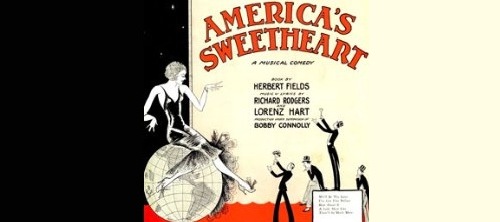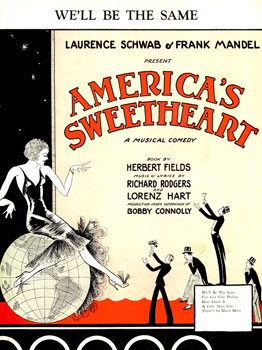
The show is a Hollywood satire. Two young lovers hitchhike to Hollywood to make their fortune. The girl hits it big and she loses interest in her boyfriend, who hasn’t done well. As the result of talking pictures, the tables are reversed, and the boy is a big star and the girl is down, but they make up.
Michael and Geraldine, came to Hollywood from St. Paul, Minnesota, determined to be silent-movie stars Geraldine becomes a success, Michael doesn't. Then come the talkies, and the situation reversed: Geraldine has a lisp (remember Marion Davies?), and now Michael is the hot property. Needless to say, love wins out in the end. First mooted as Came the Dawn, then Come Across, it finally appropriated Mary Pickford's nickname to become America's Sweetheart
Michael and Geraldine, came to Hollywood from St. Paul, Minnesota, determined to be silent-movie stars Geraldine becomes a success, Michael doesn't. Then come the talkies, and the situation reversed: Geraldine has a lisp (remember Marion Davies?), and now Michael is the hot property. Needless to say, love wins out in the end. First mooted as Came the Dawn, then Come Across, it finally appropriated Mary Pickford's nickname to become America's Sweetheart
The musical, which opened in February, 1931, at New York's Broadhurst Theatre, was the last of the "early" Rodgers and Hart musicals, and the team's final stage collaboration with Herbert Fields, with whom they had created such smash hits of the twenties as Peggy-Ann, A Connecticut Yankee, and Dearest Enemy. Among the stars were Jack Whiting as Michael Perry, Rodgers and Hart regular Inez Courtney as Madge, popular French star Jeanne Aubert as popular French star Denise Torel, and newcomer Harriette Lake (who would later change her name to Ann Sothern) as Geraldine March.
The reviews were mixed-to-excellent, with some critics waxing rhapsodic over the Fields/Rodgers/Hart skewering of movieland, while others (notably Dorothy Parker) found the songs pleasant and the book less so. (Ms. Parker also commented on the fact that Jeanne Aubert's husband had gone to court to prevent his wife's stage career. "Say what you will, the man is obviously a drama critic" she noted in true Parker fashion.)
After a modest but successful run on 135 performances, America's Sweetheart virtually vanished. For that matter, so did Rodgers and Hart. In spite of their great glee in tweaking tinsel town, it appeared that work was more plentiful for them in Hollywood, and they headed west to write a series of screen musicals (the most noteworthy of which was the gloriously innovative Love Me Tonight with Jeannette MacDonald and Maurice Chevalier). They stayed away from Broadway for almost five years. When they returned to in November 1935, with Jumbo, their style had grown noticeably more sophisticated.
Came the Dawn (working title)
Come Across (working title)
Acte I
Mr. Dolan Is Passing Through - S. A. Dolan, Executives and Ensemble
In Califor-n-i-a - Dorith, Paula and Movie Actresses
My Sweet - Madge Farrell and Larry Pitkin
I've Got Five Dollars - Geraldine March and Michael Perry
I've Got Five Dollars (Reprise) - Geraldine March and Michael Perry
Sweet Geraldine - Georgia, Georgiana and Georgette
There So Much More - Denise Torel and Larry Pitkin
We'll Be the Same - Geraldine March, Michael Perry and Ensemble
We'll Be the Same (Reprise) - Michael Perry and Larry Pitkin
How About It - Madge Farrell and Michael Perry
Innocent Chorus Girls of Yesterday - Movie Stars
A Lady Must Live - Denise Torel
Acte II
You Ain't Got No Savoir Faire - Madge Farrell and Larry Pitkin
Two Unfortunate Orphans - Paula, Dorith and Ensemble
I Want a Man - Denise Torel
Tennessee Dan - Georgia, Georgiana and Georgette
How About It (Reprise) - Denise Torel, Michael Perry, Larry Pitkin and Ensemble
Aucun dossier informatif complémentaire concernant America's Sweetheart
Aucun dossier informatif complémentaire concernant America's Sweetheart
Michael and Geraldine, came to Hollywood from St. Paul, Minnesota, determined to be silent-movie stars Geraldine becomes a success, Michael doesn't. Then come the talkies, and the situation reversed: Geraldine has a lisp (remember Marion Davies?), and now Michael is the hot property. Needless to say, love wins out in the end. First mooted as Came the Dawn, then Come Across, it finally appropriated Mary Pickford's nickname to become America's Sweetheart

Version 1
America's Sweetheart (1931-02-Broadburst Theatre-Broadway)
Type de série: Original BroadwayThéâtre: Broadhurst Theatre (Broadway - Etats-Unis) Durée : 3 mois 3 semaines Nombre : 135 représentationsPremière Preview : Inconnu
Première: 10 February 1931
Dernière: 06 June 1931Mise en scène : Monty Woolley • Chorégraphie : Bobby Connolly • Producteur : Star(s) : Commentaires longs: PAS D'ENREGISTREMENT EXISTANT !
Pas encore de video disponible pour ce spectacle